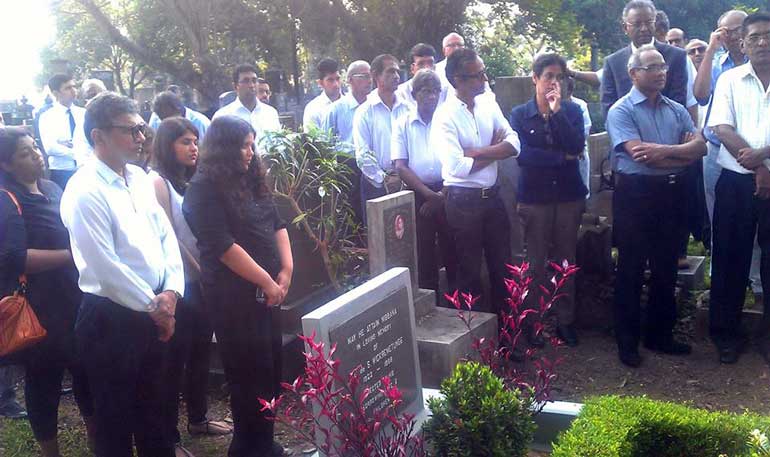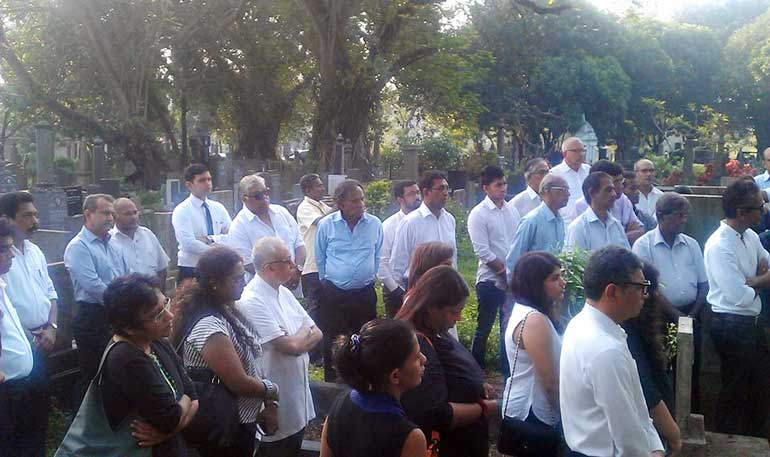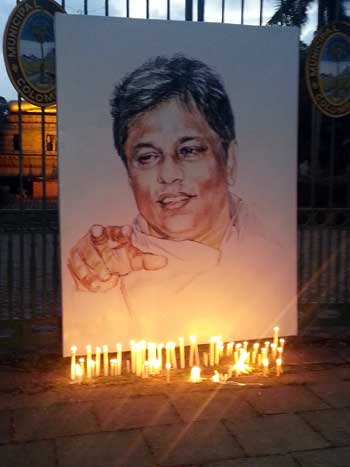Monday Feb 16, 2026
Monday Feb 16, 2026
Friday, 8 January 2016 00:00 - - {{hitsCtrl.values.hits}}


The plot thickens: Seven years ago, an iconic senior journalist was brutally slaughtered on Sri Lanka’s post-war mean streets. A year ago – on the sixth anniversary of his slaying – an instrumental change was made to the political landscape of which he was so much a part. Still, a year on, the identity of his killers remains intact: the murder mystery of the decade past... Now, perhaps more than ever, it is incumbent on Good Governance to bring justice to bear on this and other murder-mysteries of this decade
In William Shakespeare’s immature comedy #Romeo And Juliet, a character fighting a losing duel says: “Ask for me tomorrow, and you shall find me a grave man.” The emphasis falls on the word +grave – which is, of course, a play on words by the Bard. That the following day he would be dead was well known by then to the mortally wounded Mercutio. Which makes the Sweet Swan of Avon’s deathly pun that much grimmer in the end.
Well, life often imitates art. In Sri Lanka’s then fully-grown tragicomedy, an editor fated to lose the battle wrote his posthumous last editorial predicting his own death. In effect, he essayed: “Ask for me tomorrow, and you shall find me a grave man.” In short, that mercurial writer ostensibly knew that ~They Would Come For Me. The title of the late and much-lamented senior journalist’s macabre swansong was #And Then They Came. 
In and over 15 long years, the founding editor of $The Sunday Leader lived a charmed life. Not one to fight shy of severe pressure not to challenge the status quo, he squared up with fortitude to face the fire of friends and enemies. His time is short, his opponents said; some even boasting to their presidential pals that he would be dealt with short shrift. Lasantha Wickrematunge’s own understanding of his role was as that of a goad, a gadfly, a gargoyle whose trenchant and insightful exposés highlighted the ugliness of the edifice of government. He knew his end could come at any moment – many times (beatings, shootings, threats against his life and that of his family) it almost did.
But, if there was a media figure striding across the landscape of a torn and troubled land about whom it could be said that “under the bludgeonings of chance, my head remains bloody but unbowed”, this fated senior journalist was such a man. That was the motto of the newspaper he helped set up in 1994. And in the final analysis, whether or not he actually penned that last great and poignant editorial of 2009 – or whether it was the clever shadow play of an eminent ghost writer responsible for some of the $Leader’s erstwhile critiques and stinging satire – it doesn’t really matter.
What matters much, maybe, is that the media establishment he represented suspected that its much-loved editor and thought-leader would be done to death by the then incumbent Government. What matters more, perhaps, is that the now incumbent Government – which promised to arrest his killers and bring them to justice – has failed in this promise, as in many other similar promises to do what is right by the families and friends and loved ones of the myriad dead under a previous murderous regime. What matters most, without a doubt, is that our Governments – and the society of which these are a part – have not truly changed in their worldview; even if there have been cosmetic or superficial improvements to the face of governance and civil society.
So, today, on the seventh anniversary of the iconic editor’s slaughter on our mean streets – coincidentally and somewhat ironically this administration’s fateful turning point and first birthday – it is apposite and appropriate that we reflect together on how the destinies of these two entities might be intertwined.
Impunity
Seven years after Lasantha’s slaying, the socio-political and military climate has changed. It has been a sea-change, but some rich and strange things continue to happen. Death squads with military training in white vans no longer terrorise town and country; but folks in Defenders with black hearts prowl the city with the dark intention of intervening extra-judicially in civilian life. Mosques and minarets are no longer torched by flame-throwing mobs inflamed by volatile communal and inflammatory chauvinistic invective; but Muslim homes have unwelcome slogans in praise of ‘Sinhala blood’ smeared on their main gates.
Could it be that the worldview – the deepest, most fundamental core of Sri Lanka’s soul – of some citizens (of many citizens, to judge by their silence: a tacit nod: or even their stated support in social media) has not been transformed? Should the purpose of our > celebrated war-victory > not be to ensure that all of Sri Lanka’s communities can live – and expect to live, sans presidential diktat or special parliamentary largesse – in peace; and expect peace with justice for all citizens? Would someone in authority please sit up and take note... and stand up – and speak out against our innate xenophobia?
Indifference
Sorrily, it seems to the critical or untrained eye that our simmering cauldron of ethno-nationalist chauvinism is a matter of some or supreme indifference to the powers that be. This is a naive view. Because the not-so-nice take on Government’s failure to investigate and crackdown on vigilantes who sprayed the faҫades of Muslim homes in a suburban borough recently is more utilitarian or pragmatic. Certain originally progressive socialist parties presently in uneasy coalition with right-wing conservatives have traditionally been reliant on nationalist or chauvinist voter-bases in ‘The South’ (as it is still called in post-war Sri Lanka). They won’t, or don’t want to, or can’t afford to erode their precious – now vital – electoral support by taking too public a stance or too strong a stand on ethno-cultural and religious issues. Sirs: Sad! Shame! (IF it is true of you?)
Ignorance
Somewhere down the line, that *Live and Let Live* inversion may convert into *Live and Let Die*. If the vim, vigour, vitality, of several vicious voices on social media of late are to be taken at face value, such a vision translates readily enough – and frighteningly – into *We will kill all else so that We-We-And-Only-We can live in peace*. This is what lies beneath the surface of much of chauvinistic social media today. The smoother veneer of mainstream media is coated and slicked over by the patina of judicious editing and polite conventionality; so the norms of respectful social intercourse are rarely if ever sundered. If you want to test the racial or ethnic temperature of our society, leave the newspapers and news on TV alone – log in to Facebook or tap some of those tweets.
A battalion of militarised youth brutalised by the false glamour of war and the spoils of a much trumpeted triumph of one ‘race’ with ‘rights’ over another with ‘rebellious’ countercultural aspirations lurks like a gremlin in the machine of our lost generations. We pray that this brigade of frustrated ethno-nationalism – frustrated by Good Governance’s evident commitment to a multicultural ethos – will not be used by sinister forces. There are still those who could well use these ignorant armies to clash by night against those in our midst who continue to be perceived as ^The Other or ^The Enemy At Our Gate. That war against bigotry, we have by no means won!
< In the context of the discussion above, it might not seem inappropriate to suggest a litmus test for Government on this, its first, birthday. The exam – we dare say – is in two parts. First, what is the State’s integrity as regards commitment to building, safeguarding, ensuring, the continuity of a pluralistic, inclusive, harmoniously inter-relational, society? Last but not least, how good is the Administration’s capacity and capability to be the primary agency of a just society where past and present crimes are punished, and future criminalities of identified miscreants pre-empted? >
Integrity
Will Government stamp out chauvinism in all its many forms? Does it have the republican virtues of country before party or personal political agenda in its good-governance DNA?
NAIVE: Good Governance implied it would. It can. Maybe it will. All things being considered.
NECESSARY: The legislature is fractured along communal lines. That one ligament will pull in one ethnically loaded direction, and another in another, will cause fraction and dislocation.
NAUGHTY: An impending election (local government, in a few months’ time) is the best indication that nothing serious will happen. No serious issue will be broached, no less resolved.
NASTY: There is no fundamental difference in the mood and mindset of one set of mandarins now in power than the other lot of political manipulators once pulling the strings and pushing the polity’s buttons.
Would that we are wrong on the latter three counts!
Instrumentality
Even if it has been stymied by procedural challenges so far – whether envisaged or unseen at the time these promises were made to a gullible public just waiting to be inveigled – will the Administration now pursue investigations into a rash of prominent murders and punish many absconding and still at-large offenders? Can it overcome the customary propensity to blame realpolitik as being the real culprit in the inertia and lethargy of criminal investigation processes?
NAIVE: The culprits will be brought to book. That investigations are proceeding by the book is reassuring.
NECESSARY: Good Governance is necessarily bogged down by the pitfalls of procedure. Bad form to press the case as previous regimes did. So let the long arm of the law take its awfully slow course towards the aweful majesty of the law.
NAUGHTY: Delay is good... We can tweak the timings or findings and potential finishings to coincide with key dates – such as elections, and when our political opponents rattle their sabres!
NASTY: We had no intention of ever seeing this through to its end. We too have skeletons in the closet. It won’t do to dig too deep. Or go back in time far enough to get to the bottom of it all.
Which, if the latter is the true state of affairs, bodes ill for Lasantha, Wasim, Prageeth, Keith, Taraki, and all the others of their ilk who are representative victims of injustice over the last chequered decades under successive oppressive regimes. Grave for them – and their families. Graver still for a Government still ostensibly committed to Good Governance and struggling to maintain its integrity and instrumentality.
> But don’t read us wrong. Because this is not so much a diatribe against the apathy and indifference of the powers that be – and were. Rather, it is a dirge for the dead.
By the time you read this, Lasantha Wickrematunge would have been stone~cold~dead for over 2,555 days. While the initial anger and outrage at his violent death could well have abated, the grief and sense of tragic loss abide. And now, as always – perhaps more than ever, now that we can see it with the 20:20 vision of hindsight – there will be a persistent sense that with this brutal assassination of yet another scribe, an indefinable line has been crossed.
Of course, this may be the sentiment of a few who had the (some may claim dubious) privilege of being trained in the ^Lasantha School of Journalism^. His detractors may view this as such, but that is their prerogative. Neither they nor any other can subtract from the fact that with the possible exception of a star reporter or two, and a stellar editorialist who once flew a unique flag at #The Leader, all of Lasantha’s acolytes were but satellites – Minor planets and passing meteoroids in a solar system whose allure has been dimmed by the supernova of a sun untimely plucked out of the mediascape. And consigned to a cold eternity of cold remembrances and cool praise. Verbose, perhaps, but only purple prose would prompt the powers that be and prick their dormant cynical consciences?
But let us not wax poetic too long and thereby give the wrong impression. The late venerated editor may have been a shining journalist in a galaxy of faint fellow-travellers; but it is felt that his brand of politics and pragmatic approach to investigative journalism left something to be desired. He was personally ambitious (perhaps politically so) and he took short cuts. However, all that is academic now – and, in any case, we will take refuge in the ancient Greek maxim > De mortuis nil nisi bonum > “Nothing but good about the dead”…
Be that as it may, the point cannot be made often enough in an illiterate milieu such as ours that a man’s opinions do not warrant his life… And it was the duty of each and every one of us to defend to the death the mandate of Lasantha Wickrematunge to publish and be damned. Right or wrong, he had a constitutionally enshrined brief to air his views and print all the news he and his publication saw fit to dish out to readers. Perceived vested interests notwithstanding, newspapers are the lifeblood of a nation talking to itself. Rumours apart, readers have responsibility to accept or reject the fare to which they are subjected every Sunday. The law alone had the duty of keeping the #Leader on the straight and narrow – not the kangaroo court, perhaps, that drew on the realities of the battle-scarred post-Kilinochchi politico-military landscape to justify this journalist’s expedient demise.
It is a byword among true democrats and republicans alike that under the rule of persons entirely great, the pen is mightier than the sword. Words fail us to express what such developments as have formerly taken place must then imply for the Fourth Estate since 8 January 2009. Should we be willing even for a moment to omit mentioning the men and the women unknown to us by name who have been hampered, hindered, harangued, harassed, and hamstrung, in the course of their journalistic work, the litany of names and pseudonyms of writers and editors abducted or assassinated must make us wake up to the reality that today the tongue-talk is mightier than the sworn-to-act-word… Dharmalingam Sivaram, Keith Noyahr, Lasantha Wickrematunge; Taraki, Senpathi, Suranimala: these scribes (among myriad others, some unnamed, many unsung) sacrificed life and liberty so that we all could – albeit briefly, before we returned to our trivial rounds and common tasks – consider our collective predicament.
Namely, that media freedom for a long decade of darkness meant merely the liberty to take your life into your own hands – if, as, and when you decided that your duty and calling was to complain long and loud at the state of the nation, and not comply with the bidding of those who once ran the country – and were seen to be running it into the ground. Also, more importantly, that every attempt then to silence and terrorise the media – from the state’s incarceration of J. S. Tissainayagam on spurious grounds to unknown assailants vandalising of the MBC/MTV broadcasting complex and Multipacks press – was a blow that was directed against every thinking and feeling member of the body politic. A blow that is yet to be reckoned with; its perpetrators yet to be identified, let alone apprehended.
The former Government’s contention that all these egregious acts were attempts by some as-yet-unidentified party seeking to bring into disrepute the then incumbent administration could be safely dismissed. For a war machine that so successfully brought the scourge of terrorism to its knees had no excuse for not rooting out the cowardly villains who killed an unarmed man whose greatest crime was that he defied the establishment. But what of the present Government’s feet-dragging and trotting-out of sundry reasons or excuses? For a political movement that so successfully brought the scourge of an authoritarian antidemocratic regime to heel has no reason for not rooting out the cowardly villains who ordered the execution of someone who – had he been alive today – would have been one of its foremost champions. Or perhaps not?
The year of grace is up. Happy birthday/anniversary! Grieve they may, as people or as a party of which the slain editor was demonstrably a part. Get on with seeing to it that justice is done – and seen to be done – and done expediently – is a must, not a might. Government’s reputation, duration, consummation, are riding on it.